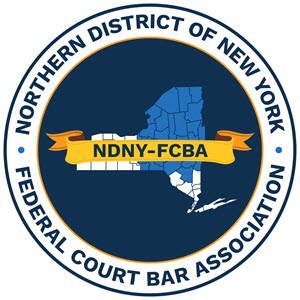The FCBA awarded a total of $4,500 in prize money to 20 high school students as part of the Fifth Annual Constitution Contest, which is co-sponsored by the U.S. District Court.
This year, the number of contest categories was expanded to four: (1) essays, which had to be typed, between 1,000 and 2,000 words in length, and based exclusively on primary sources that were cited in a recognized system of citation; (2) poems/short stories, which had to be between 100 and 2,000 words in length; (3) graphic art (e.g., a drawing, painting, photograph or print), which had to be on one piece of material (whatever the size); and (4) video performances (e,g., a speech, song, or skit/play, etc.), which had to be fewer than ten minutes in duration. Similarly the number of available subjects was expanded to 19. (As in prior years, all entries still had to regard the origin of some aspect of the U.S. Constitution.)
New subjects included the following: (1) why Philadelphia was chosen as the site of the convention, and what the benefits and drawbacks of that choice were; (2) why deliberations were kept confidential during the convention, and how things might have turned out differently if they had not been; (3) how and why the election of senators was changed through the Seventeenth Amendment; (4) why the framers decided to have a Senate at all (i.e., an upper legislative chamber composed of individuals chosen by state legislatures, as opposed to a unicameral legislature); (5) why the framers created an electoral college; and (6) the roles women played, and/or the impact they had, during the Constitutional Convention and/or ratification of the Constitution (e.g., Martha Washington, Dolly Madison, Elizabeth Hamilton).
The contest was open to all students in grades 9 through 12 in the 32 counties that constitute the Northern District of New York. Notices of the contest were emailed to teachers and administrators at each high school in the Northern District, and were published on social media websites, including Twitter and TikTok.
Forty-one entries were received across all four categories: nine entries in the Essay Category, twenty-nine entries in the Poem/Short Story Category, two entries in the Graphic Art Category, and one entry in the Video-Performance Category. Entries were received from students at five public high schools (Guilderland High School in Albany County, Niskayuna High School in Schenectady County, South Glens Falls Senior High School in Saratoga County, Fayetteville-Manlius and Jamesville-DeWitt High Schools in Onondaga County), and one private high school (Tyburn Academy in Cayuga County).
Entries in the Essay Category were evaluated by three federal judges (Chief U.S. District Judge Glenn T. Suddaby, U.S. District Judge Mae A. D’Agostino, and U.S. District Judge Brenda K. Sannes). Entries in the Poem/Short Story Category and Graphic Art Category were also evaluated by three federal judges (District Judge Sannes, U.S. Magistrate Judge Thérèse Wiley Dancks, and U.S. Magistrate Judge Daniel J. Stewart). All entries were evaluated based on originality, clarity, historical accuracy, thoroughness and persuasiveness. In addition, all entries were redacted to keep the entrant’s identity anonymous.
In the Essay Category, first place went to Gabriella Modesti, a twelfth-grader from Jamesville-DeWitt High School, who received $750 for her essay “The Founding Fathers Kept a Secret.” Second place went to Maryn Alexander, a tenth-grader from Guilderland High School, who received $325 for her essay “The Nature of Power.” Third place went to Parker Taft, a twelfth-grader from South Glens Falls Senior High School, who received $125 for his essay on the independence of the federal judiciary. In the Poem/Short Story Category, first place went to Jack Zizza, a tenth-grader from Tyburn Academy, who received $750 for his poem “Why Have a Senate at All?” Second place went to Abigail Casavant, a tenth-grader from Guilderland High School, who received $325 for her poem “Remember The Ladies.” Third place went to Ansh Garg, a tenth-grader from Guilderland High School, who received $125 for her poem “A Divided Unity.” In the Graphic Art Category, first place went to Zoe Costanza, an eleventh-grader from Fayetteville-Manlius High School, who won $750 for her piece “Why Philadelphia?” Second place went to Flavia Scott, a twelfth-grader from Fayetteville-Manlius High School, who won $325 for her piece “Remember the Ladies.” In the Video-Performance Category, first place went to Alex Mravlja, a twelfth-grader from Niskayuna High School, who received $750 for her speech on the separation-of-powers and checks-and-balances.
In the Essay and Poem/Short Story Categories, Honorable Mentions (and prizes of $25) were given to eleven students: (1) Jessica Airhienbuwa, a tenth-grader from Guilderland High School, for her essay “How Senators Were Originally Chosen and Why, and How and Why This Process Was Changed”; (2) Leah Punnoose, a tenth-grader from Guilderland High School, for her essay “Ratified Women”; (3) Jenay Bartlett, a tenth-grader from Guilderland High School, for her essay “Origins of the U.S. Senate”; (4) Sean Neimeyer, a tenth-grader from Guilderland High School, for his essay “Mistakes Are Made”; (5) Dilni Pathirana, a tenth-grader from Guilderland High School, for her essay “The Darkest Layers”; (6) Michael Cheng, a tenth-grader from Guilderland High School, for his poem “A Stool to Rool”; (7) Sareena Gurung, a tenth-grader from Guilderland High School, for her poem “Where the Tempestuous Fire Will Go”; (8) Meghana Bhupati, a tenth-grader from Guilderland High School, for her poem “Search for Truth and Ideals”; (9) Nick Rigosu, a tenth-grader from Guilderland High School, for his poem “A Numbers Game”; (10) Erilda Pengu, a tenth-grader from Guilderland High School, for her poem “Voices in the Dark”; and (11) Arun Venkitanarayanan, a tenth-grader from Guilderland High School, for his short story “Escape to Freedom.”
A sixth annual contest will be announced in the fall of 2020. A list of official rules, along with project topics and links to historical sources, is available on the contest’s website, www.constitutionalscholars.org.

